
pydantic-ai
GenAI Agent Framework, the Pydantic way
Stars: 14991
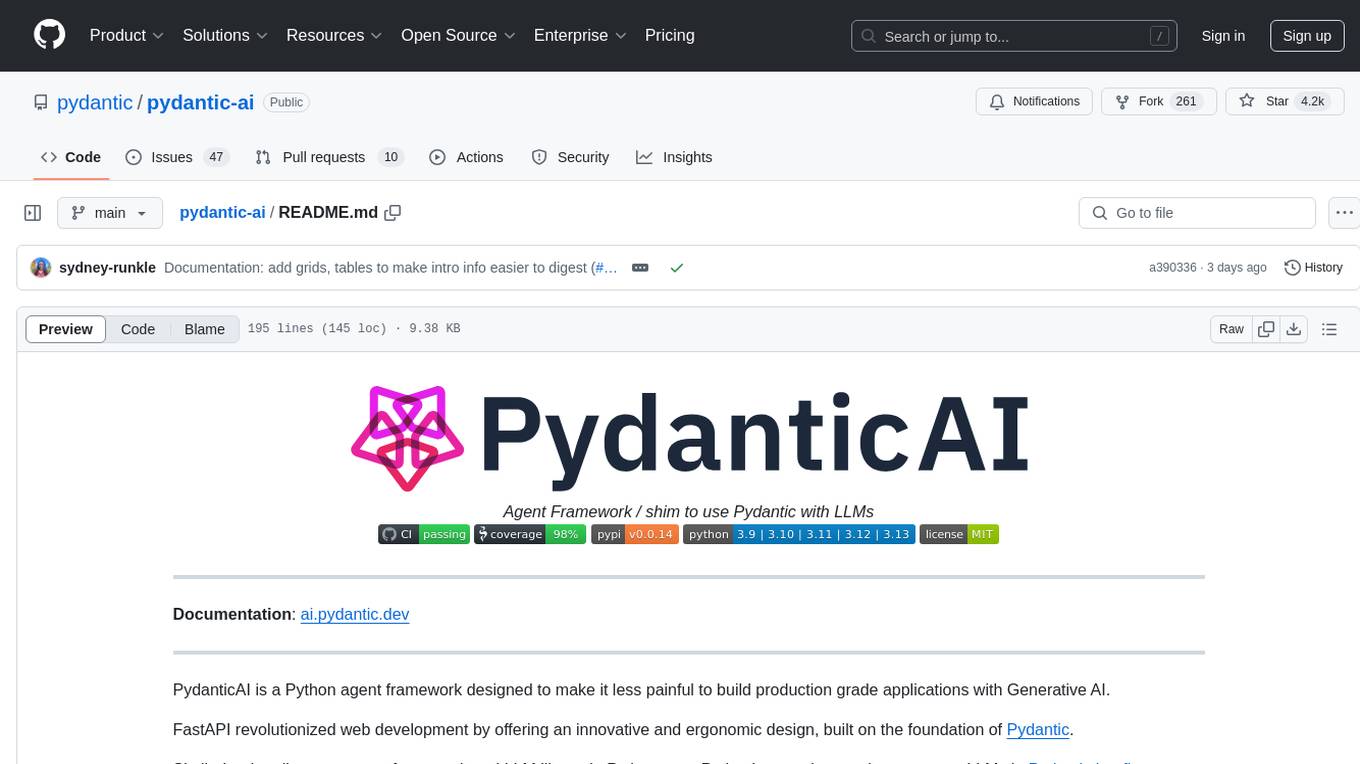
PydanticAI is a Python agent framework designed to make it less painful to build production grade applications with Generative AI. It is built by the Pydantic Team and supports various AI models like OpenAI, Anthropic, Gemini, Ollama, Groq, and Mistral. PydanticAI seamlessly integrates with Pydantic Logfire for real-time debugging, performance monitoring, and behavior tracking of LLM-powered applications. It is type-safe, Python-centric, and offers structured responses, dependency injection system, and streamed responses. PydanticAI is in early beta, offering a Python-centric design to apply standard Python best practices in AI-driven projects.
README:
Documentation: ai.pydantic.dev
Pydantic AI is a Python agent framework designed to help you quickly, confidently, and painlessly build production grade applications and workflows with Generative AI.
FastAPI revolutionized web development by offering an innovative and ergonomic design, built on the foundation of Pydantic Validation and modern Python features like type hints.
Yet despite virtually every Python agent framework and LLM library using Pydantic Validation, when we began to use LLMs in Pydantic Logfire, we couldn't find anything that gave us the same feeling.
We built Pydantic AI with one simple aim: to bring that FastAPI feeling to GenAI app and agent development.
-
Built by the Pydantic Team: Pydantic Validation is the validation layer of the OpenAI SDK, the Google ADK, the Anthropic SDK, LangChain, LlamaIndex, AutoGPT, Transformers, CrewAI, Instructor and many more. Why use the derivative when you can go straight to the source? 😃
-
Model-agnostic: Supports virtually every model and provider: OpenAI, Anthropic, Gemini, DeepSeek, Grok, Cohere, Mistral, and Perplexity; Azure AI Foundry, Amazon Bedrock, Google Vertex AI, Ollama, LiteLLM, Groq, OpenRouter, Together AI, Fireworks AI, Cerebras, Hugging Face, GitHub, Heroku, Vercel, Nebius, OVHcloud, Alibaba Cloud, SambaNova, and Outlines. If your favorite model or provider is not listed, you can easily implement a custom model.
-
Seamless Observability: Tightly integrates with Pydantic Logfire, our general-purpose OpenTelemetry observability platform, for real-time debugging, evals-based performance monitoring, and behavior, tracing, and cost tracking. If you already have an observability platform that supports OTel, you can use that too.
-
Fully Type-safe: Designed to give your IDE or AI coding agent as much context as possible for auto-completion and type checking, moving entire classes of errors from runtime to write-time for a bit of that Rust "if it compiles, it works" feel.
-
Powerful Evals: Enables you to systematically test and evaluate the performance and accuracy of the agentic systems you build, and monitor the performance over time in Pydantic Logfire.
-
MCP, A2A, and UI: Integrates the Model Context Protocol, Agent2Agent, and various UI event stream standards to give your agent access to external tools and data, let it interoperate with other agents, and build interactive applications with streaming event-based communication.
-
Human-in-the-Loop Tool Approval: Easily lets you flag that certain tool calls require approval before they can proceed, possibly depending on tool call arguments, conversation history, or user preferences.
-
Durable Execution: Enables you to build durable agents that can preserve their progress across transient API failures and application errors or restarts, and handle long-running, asynchronous, and human-in-the-loop workflows with production-grade reliability.
-
Streamed Outputs: Provides the ability to stream structured output continuously, with immediate validation, ensuring real time access to generated data.
-
Graph Support: Provides a powerful way to define graphs using type hints, for use in complex applications where standard control flow can degrade to spaghetti code.
Realistically though, no list is going to be as convincing as giving it a try and seeing how it makes you feel!
Here's a minimal example of Pydantic AI:
from pydantic_ai import Agent
# Define a very simple agent including the model to use, you can also set the model when running the agent.
agent = Agent(
'anthropic:claude-sonnet-4-6',
# Register static instructions using a keyword argument to the agent.
# For more complex dynamically-generated instructions, see the example below.
instructions='Be concise, reply with one sentence.',
)
# Run the agent synchronously, conducting a conversation with the LLM.
result = agent.run_sync('Where does "hello world" come from?')
print(result.output)
"""
The first known use of "hello, world" was in a 1974 textbook about the C programming language.
"""(This example is complete, it can be run "as is", assuming you've installed the pydantic_ai package)
The exchange will be very short: Pydantic AI will send the instructions and the user prompt to the LLM, and the model will return a text response.
Not very interesting yet, but we can easily add tools, dynamic instructions, and structured outputs to build more powerful agents.
Here is a concise example using Pydantic AI to build a support agent for a bank:
(Better documented example in the docs)
from dataclasses import dataclass
from pydantic import BaseModel, Field
from pydantic_ai import Agent, RunContext
from bank_database import DatabaseConn
# SupportDependencies is used to pass data, connections, and logic into the model that will be needed when running
# instructions and tool functions. Dependency injection provides a type-safe way to customise the behavior of your agents.
@dataclass
class SupportDependencies:
customer_id: int
db: DatabaseConn
# This Pydantic model defines the structure of the output returned by the agent.
class SupportOutput(BaseModel):
support_advice: str = Field(description='Advice returned to the customer')
block_card: bool = Field(description="Whether to block the customer's card")
risk: int = Field(description='Risk level of query', ge=0, le=10)
# This agent will act as first-tier support in a bank.
# Agents are generic in the type of dependencies they accept and the type of output they return.
# In this case, the support agent has type `Agent[SupportDependencies, SupportOutput]`.
support_agent = Agent(
'openai:gpt-5.2',
deps_type=SupportDependencies,
# The response from the agent will, be guaranteed to be a SupportOutput,
# if validation fails the agent is prompted to try again.
output_type=SupportOutput,
instructions=(
'You are a support agent in our bank, give the '
'customer support and judge the risk level of their query.'
),
)
# Dynamic instructions can make use of dependency injection.
# Dependencies are carried via the `RunContext` argument, which is parameterized with the `deps_type` from above.
# If the type annotation here is wrong, static type checkers will catch it.
@support_agent.instructions
async def add_customer_name(ctx: RunContext[SupportDependencies]) -> str:
customer_name = await ctx.deps.db.customer_name(id=ctx.deps.customer_id)
return f"The customer's name is {customer_name!r}"
# The `tool` decorator let you register functions which the LLM may call while responding to a user.
# Again, dependencies are carried via `RunContext`, any other arguments become the tool schema passed to the LLM.
# Pydantic is used to validate these arguments, and errors are passed back to the LLM so it can retry.
@support_agent.tool
async def customer_balance(
ctx: RunContext[SupportDependencies], include_pending: bool
) -> float:
"""Returns the customer's current account balance."""
# The docstring of a tool is also passed to the LLM as the description of the tool.
# Parameter descriptions are extracted from the docstring and added to the parameter schema sent to the LLM.
balance = await ctx.deps.db.customer_balance(
id=ctx.deps.customer_id,
include_pending=include_pending,
)
return balance
... # In a real use case, you'd add more tools and a longer system prompt
async def main():
deps = SupportDependencies(customer_id=123, db=DatabaseConn())
# Run the agent asynchronously, conducting a conversation with the LLM until a final response is reached.
# Even in this fairly simple case, the agent will exchange multiple messages with the LLM as tools are called to retrieve an output.
result = await support_agent.run('What is my balance?', deps=deps)
# The `result.output` will be validated with Pydantic to guarantee it is a `SupportOutput`. Since the agent is generic,
# it'll also be typed as a `SupportOutput` to aid with static type checking.
print(result.output)
"""
support_advice='Hello John, your current account balance, including pending transactions, is $123.45.' block_card=False risk=1
"""
result = await support_agent.run('I just lost my card!', deps=deps)
print(result.output)
"""
support_advice="I'm sorry to hear that, John. We are temporarily blocking your card to prevent unauthorized transactions." block_card=True risk=8
"""To try Pydantic AI for yourself, install it and follow the instructions in the examples.
Read the docs to learn more about building applications with Pydantic AI.
Read the API Reference to understand Pydantic AI's interface.
Join Slack or file an issue on GitHub if you have any questions.
For Tasks:
Click tags to check more tools for each tasksFor Jobs:
Alternative AI tools for pydantic-ai
Similar Open Source Tools

pydantic-ai
PydanticAI is a Python agent framework designed to make it less painful to build production grade applications with Generative AI. It is built by the Pydantic Team and supports various AI models like OpenAI, Anthropic, Gemini, Ollama, Groq, and Mistral. PydanticAI seamlessly integrates with Pydantic Logfire for real-time debugging, performance monitoring, and behavior tracking of LLM-powered applications. It is type-safe, Python-centric, and offers structured responses, dependency injection system, and streamed responses. PydanticAI is in early beta, offering a Python-centric design to apply standard Python best practices in AI-driven projects.
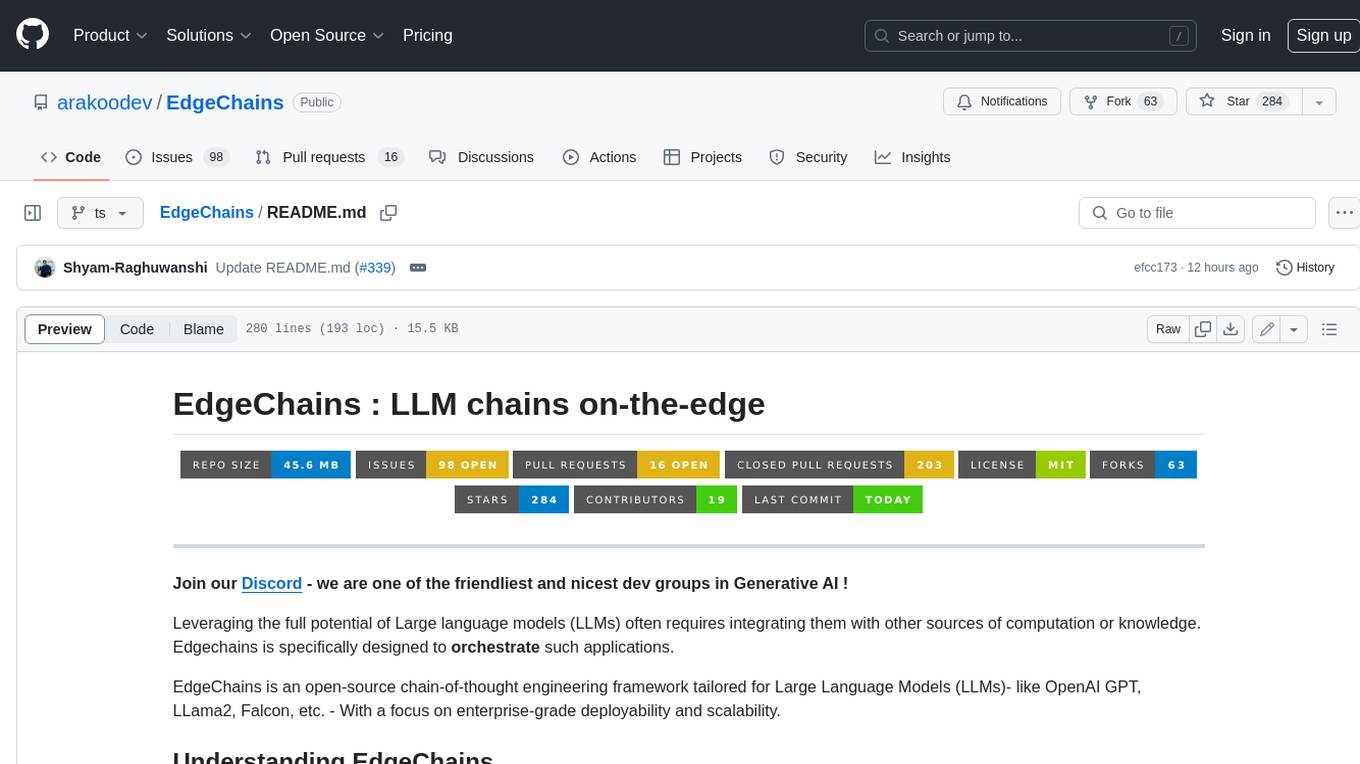
EdgeChains
EdgeChains is an open-source chain-of-thought engineering framework tailored for Large Language Models (LLMs)- like OpenAI GPT, LLama2, Falcon, etc. - With a focus on enterprise-grade deployability and scalability. EdgeChains is specifically designed to **orchestrate** such applications. At EdgeChains, we take a unique approach to Generative AI - we think Generative AI is a deployment and configuration management challenge rather than a UI and library design pattern challenge. We build on top of a tech that has solved this problem in a different domain - Kubernetes Config Management - and bring that to Generative AI. Edgechains is built on top of jsonnet, originally built by Google based on their experience managing a vast amount of configuration code in the Borg infrastructure.
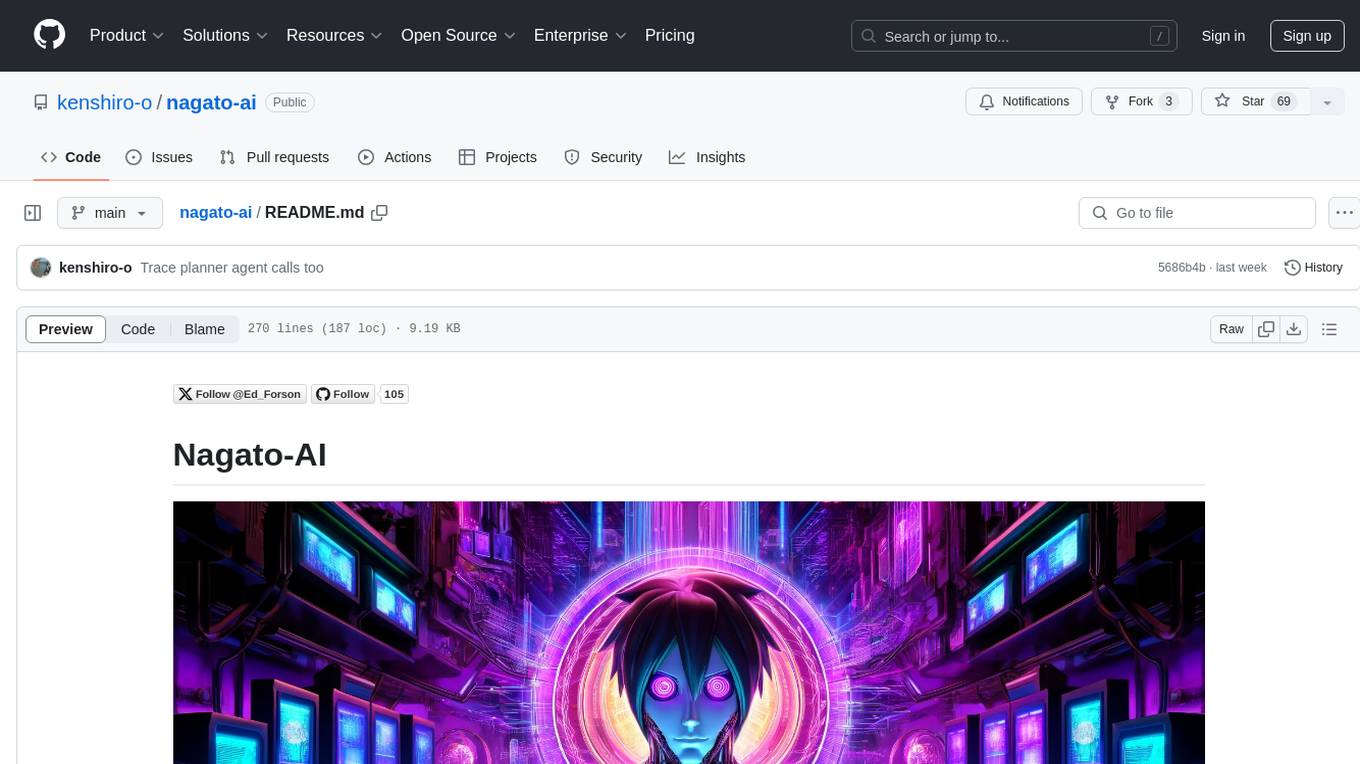
nagato-ai
Nagato-AI is an intuitive AI Agent library that supports multiple LLMs including OpenAI's GPT, Anthropic's Claude, Google's Gemini, and Groq LLMs. Users can create agents from these models and combine them to build an effective AI Agent system. The library is named after the powerful ninja Nagato from the anime Naruto, who can control multiple bodies with different abilities. Nagato-AI acts as a linchpin to summon and coordinate AI Agents for specific missions. It provides flexibility in programming and supports tools like Coordinator, Researcher, Critic agents, and HumanConfirmInputTool.
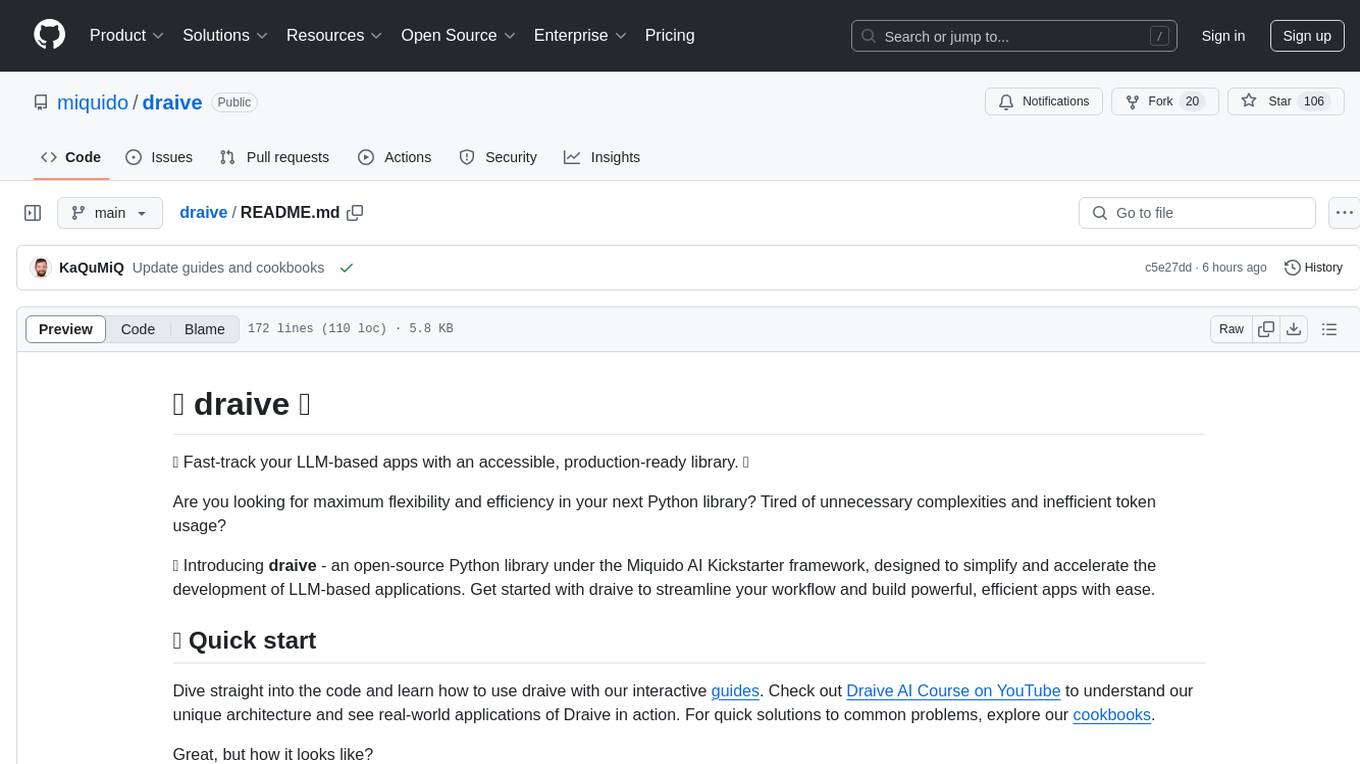
draive
draive is an open-source Python library designed to simplify and accelerate the development of LLM-based applications. It offers abstract building blocks for connecting functionalities with large language models, flexible integration with various AI solutions, and a user-friendly framework for building scalable data processing pipelines. The library follows a function-oriented design, allowing users to represent complex programs as simple functions. It also provides tools for measuring and debugging functionalities, ensuring type safety and efficient asynchronous operations for modern Python apps.
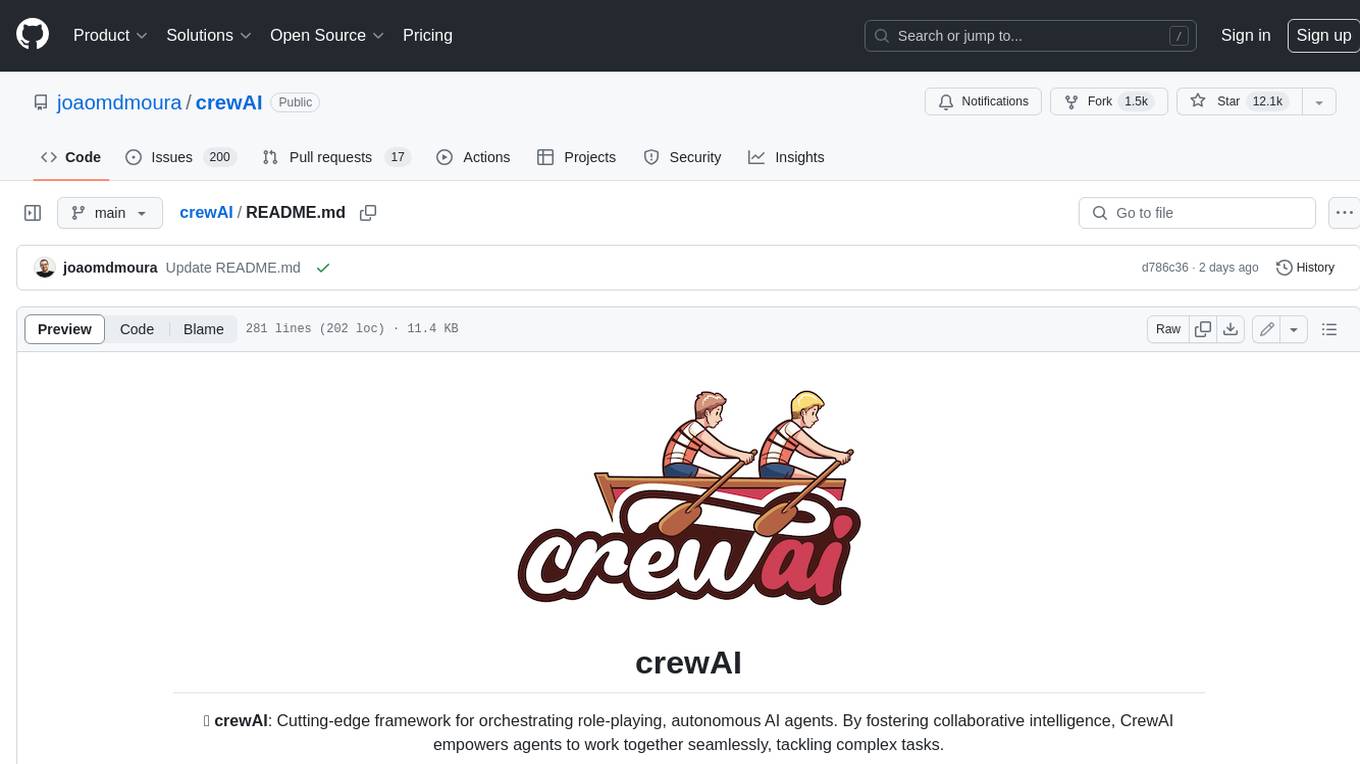
crewAI
crewAI is a cutting-edge framework for orchestrating role-playing, autonomous AI agents. By fostering collaborative intelligence, CrewAI empowers agents to work together seamlessly, tackling complex tasks. It provides a flexible and structured approach to AI collaboration, enabling users to define agents with specific roles, goals, and tools, and assign them tasks within a customizable process. crewAI supports integration with various LLMs, including OpenAI, and offers features such as autonomous task delegation, flexible task management, and output parsing. It is open-source and welcomes contributions, with a focus on improving the library based on usage data collected through anonymous telemetry.
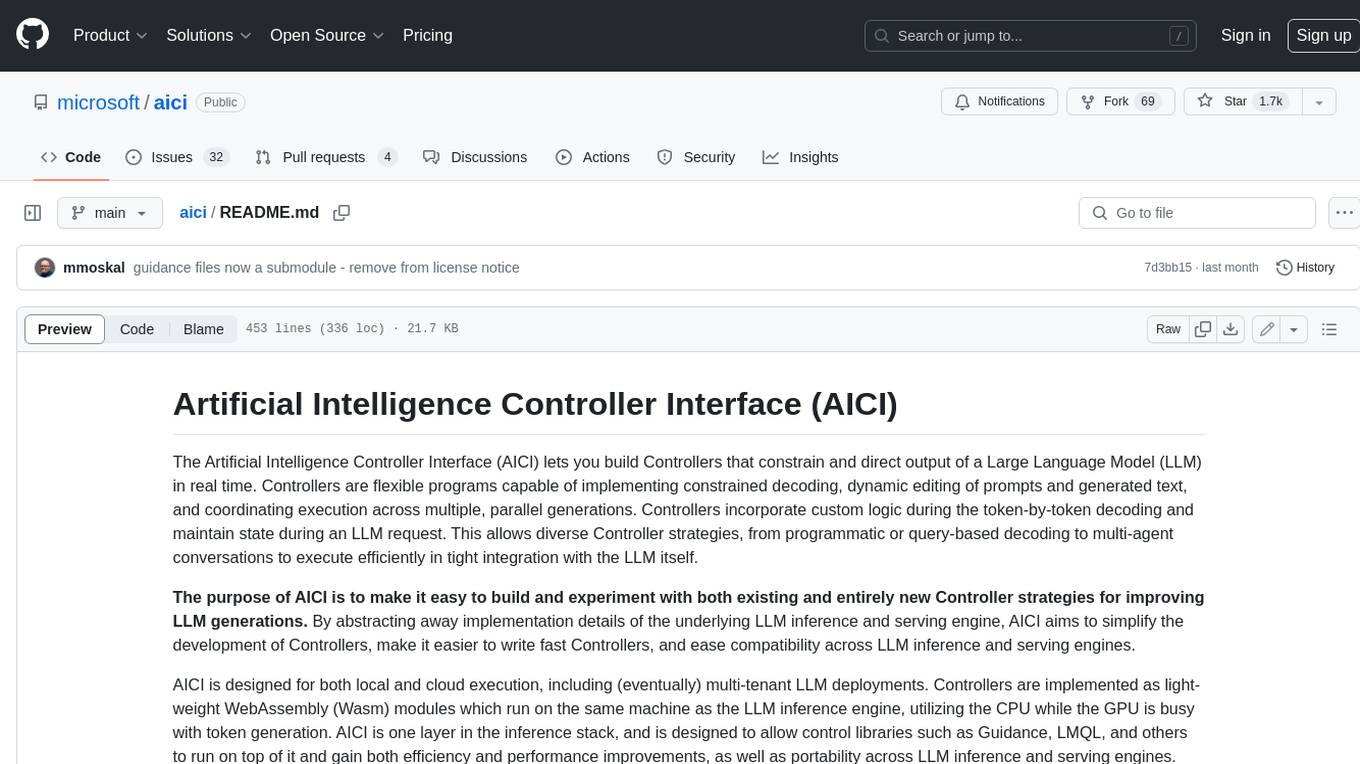
aici
The Artificial Intelligence Controller Interface (AICI) lets you build Controllers that constrain and direct output of a Large Language Model (LLM) in real time. Controllers are flexible programs capable of implementing constrained decoding, dynamic editing of prompts and generated text, and coordinating execution across multiple, parallel generations. Controllers incorporate custom logic during the token-by-token decoding and maintain state during an LLM request. This allows diverse Controller strategies, from programmatic or query-based decoding to multi-agent conversations to execute efficiently in tight integration with the LLM itself.
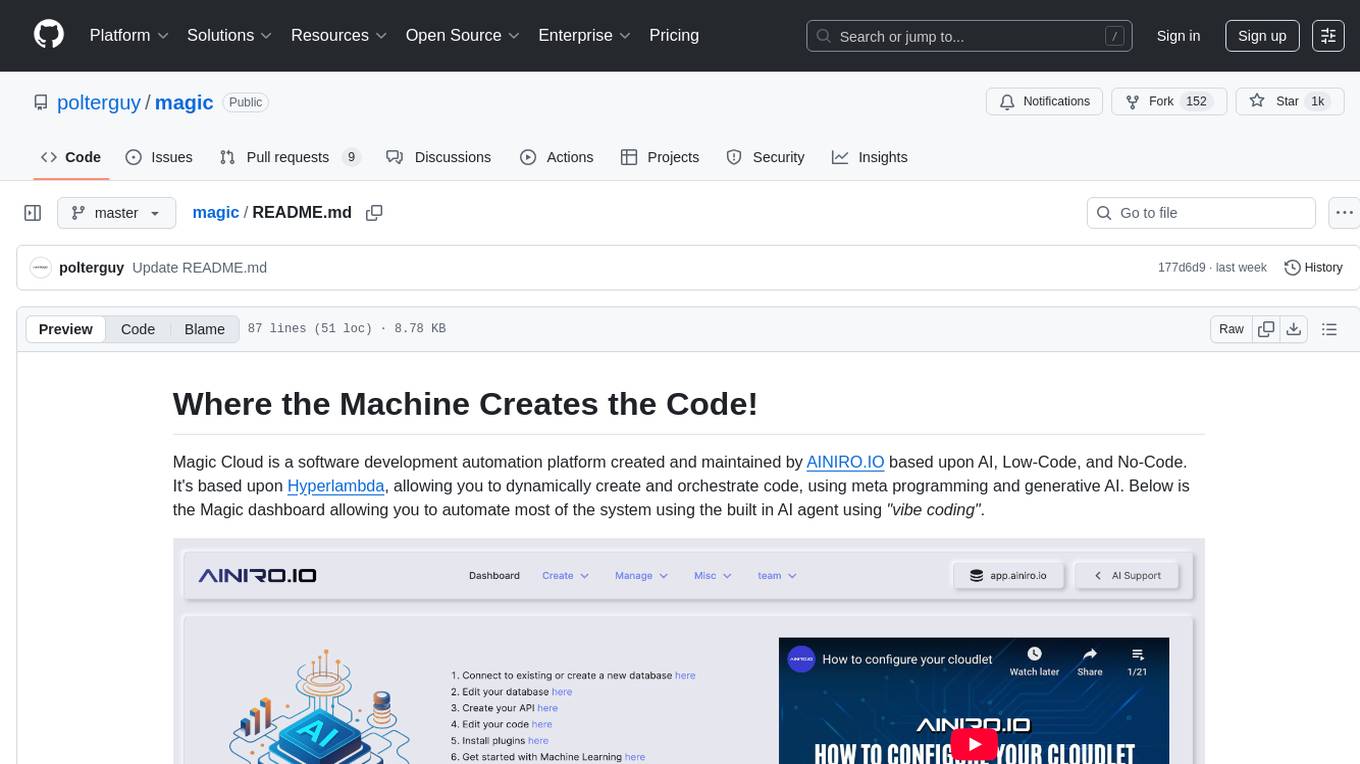
magic
Magic Cloud is a software development automation platform based on AI, Low-Code, and No-Code. It allows dynamic code creation and orchestration using Hyperlambda, generative AI, and meta programming. The platform includes features like CRUD generation, No-Code AI, Hyperlambda programming language, AI agents creation, and various components for software development. Magic is suitable for backend development, AI-related tasks, and creating AI chatbots. It offers high-level programming capabilities, productivity gains, and reduced technical debt.
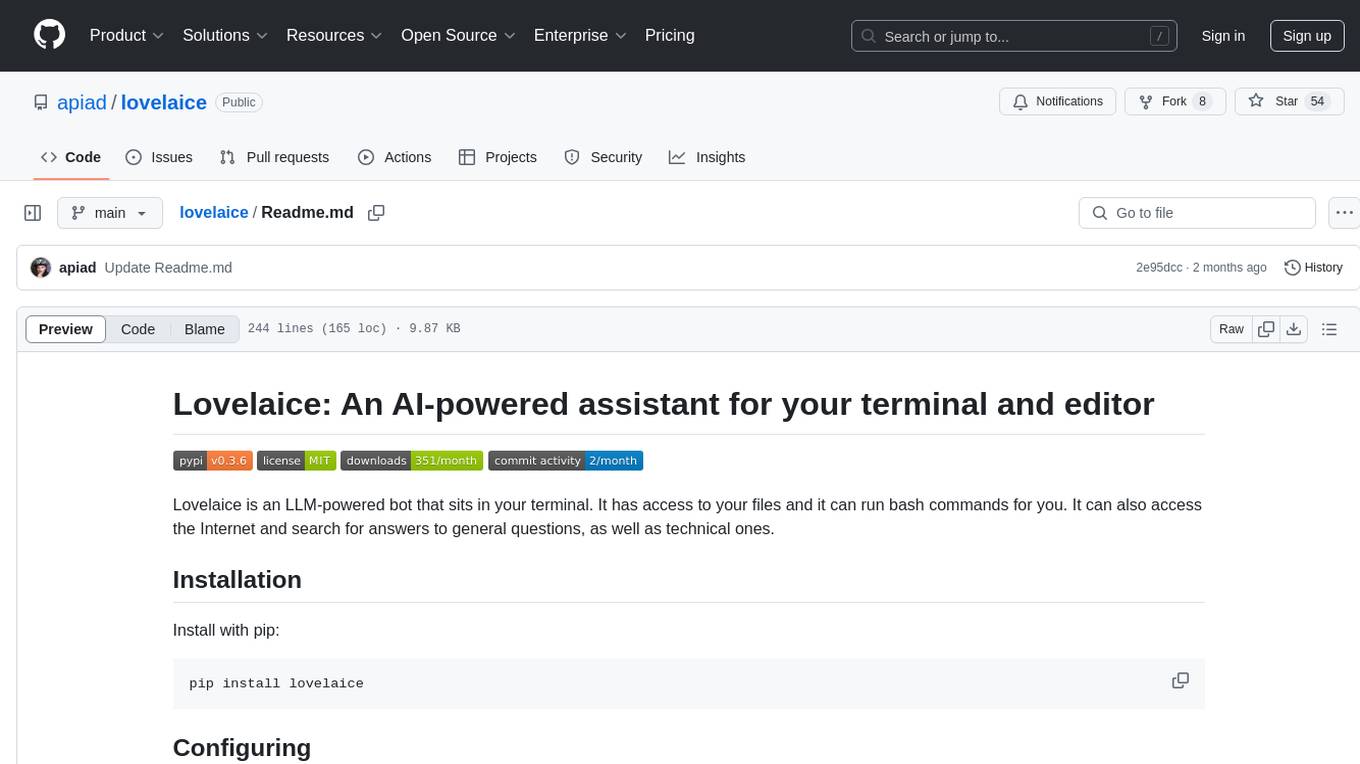
lovelaice
Lovelaice is an AI-powered assistant for your terminal and editor. It can run bash commands, search the Internet, answer general and technical questions, complete text files, chat casually, execute code in various languages, and more. Lovelaice is configurable with API keys and LLM models, and can be used for a wide range of tasks requiring bash commands or coding assistance. It is designed to be versatile, interactive, and helpful for daily tasks and projects.
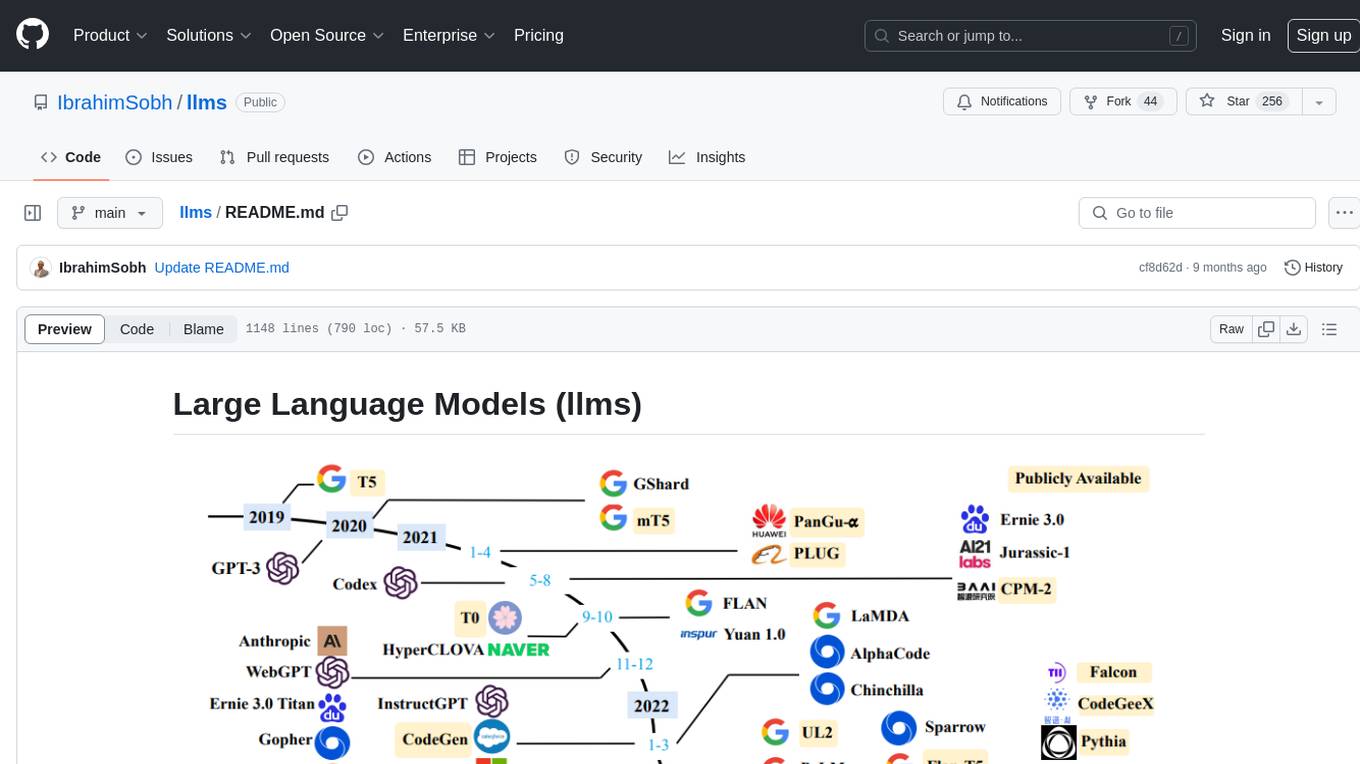
llms
The 'llms' repository is a comprehensive guide on Large Language Models (LLMs), covering topics such as language modeling, applications of LLMs, statistical language modeling, neural language models, conditional language models, evaluation methods, transformer-based language models, practical LLMs like GPT and BERT, prompt engineering, fine-tuning LLMs, retrieval augmented generation, AI agents, and LLMs for computer vision. The repository provides detailed explanations, examples, and tools for working with LLMs.

project_alice
Alice is an agentic workflow framework that integrates task execution and intelligent chat capabilities. It provides a flexible environment for creating, managing, and deploying AI agents for various purposes, leveraging a microservices architecture with MongoDB for data persistence. The framework consists of components like APIs, agents, tasks, and chats that interact to produce outputs through files, messages, task results, and URL references. Users can create, test, and deploy agentic solutions in a human-language framework, making it easy to engage with by both users and agents. The tool offers an open-source option, user management, flexible model deployment, and programmatic access to tasks and chats.
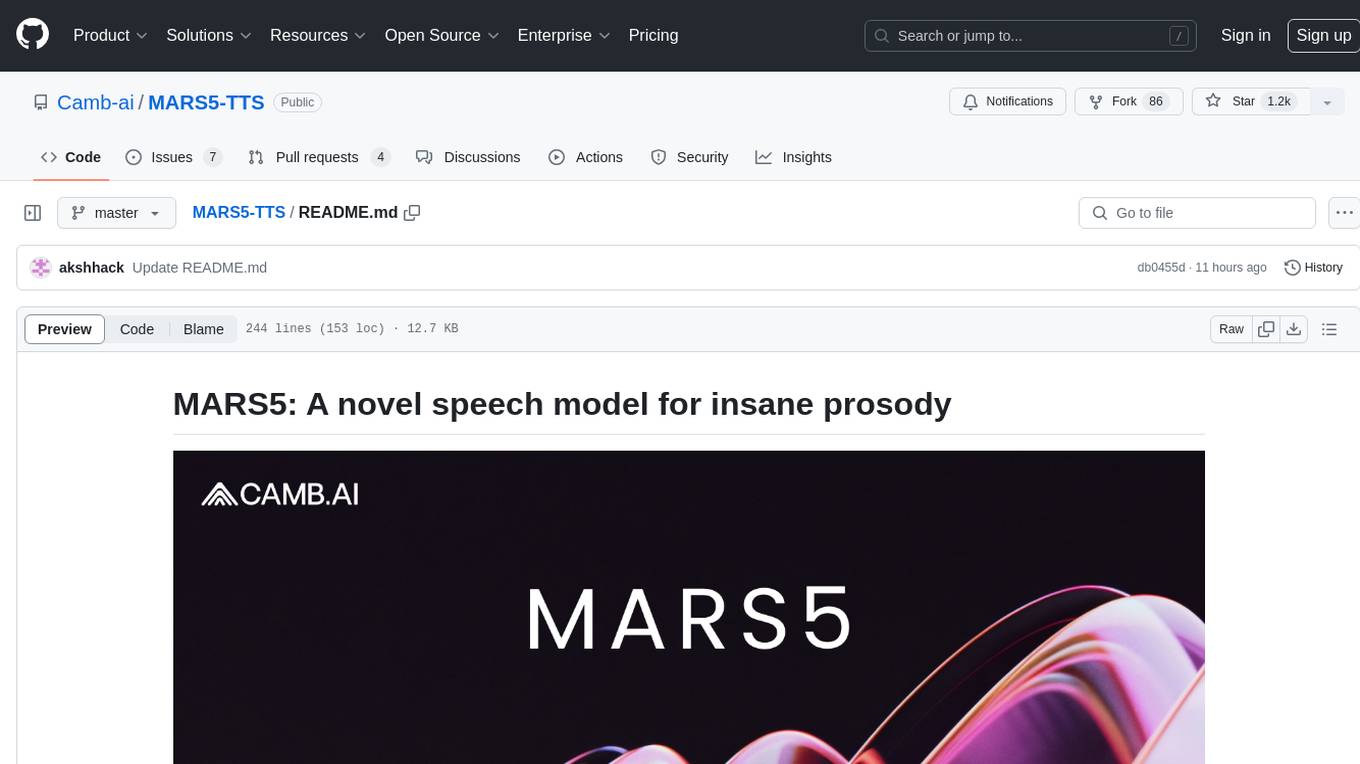
MARS5-TTS
MARS5 is a novel English speech model (TTS) developed by CAMB.AI, featuring a two-stage AR-NAR pipeline with a unique NAR component. The model can generate speech for various scenarios like sports commentary and anime with just 5 seconds of audio and a text snippet. It allows steering prosody using punctuation and capitalization in the transcript. Speaker identity is specified using an audio reference file, enabling 'deep clone' for improved quality. The model can be used via torch.hub or HuggingFace, supporting both shallow and deep cloning for inference. Checkpoints are provided for AR and NAR models, with hardware requirements of 750M+450M params on GPU. Contributions to improve model stability, performance, and reference audio selection are welcome.
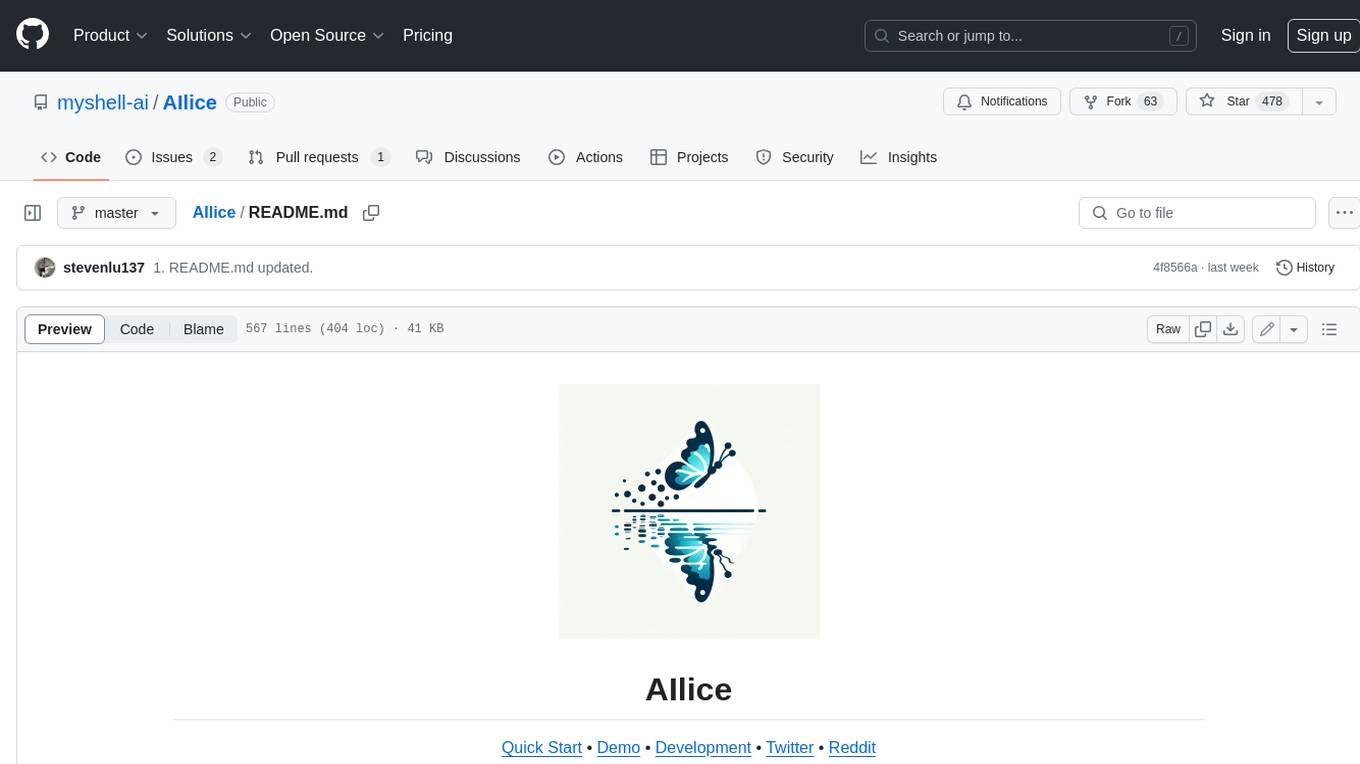
AIlice
AIlice is a fully autonomous, general-purpose AI agent that aims to create a standalone artificial intelligence assistant, similar to JARVIS, based on the open-source LLM. AIlice achieves this goal by building a "text computer" that uses a Large Language Model (LLM) as its core processor. Currently, AIlice demonstrates proficiency in a range of tasks, including thematic research, coding, system management, literature reviews, and complex hybrid tasks that go beyond these basic capabilities. AIlice has reached near-perfect performance in everyday tasks using GPT-4 and is making strides towards practical application with the latest open-source models. We will ultimately achieve self-evolution of AI agents. That is, AI agents will autonomously build their own feature expansions and new types of agents, unleashing LLM's knowledge and reasoning capabilities into the real world seamlessly.
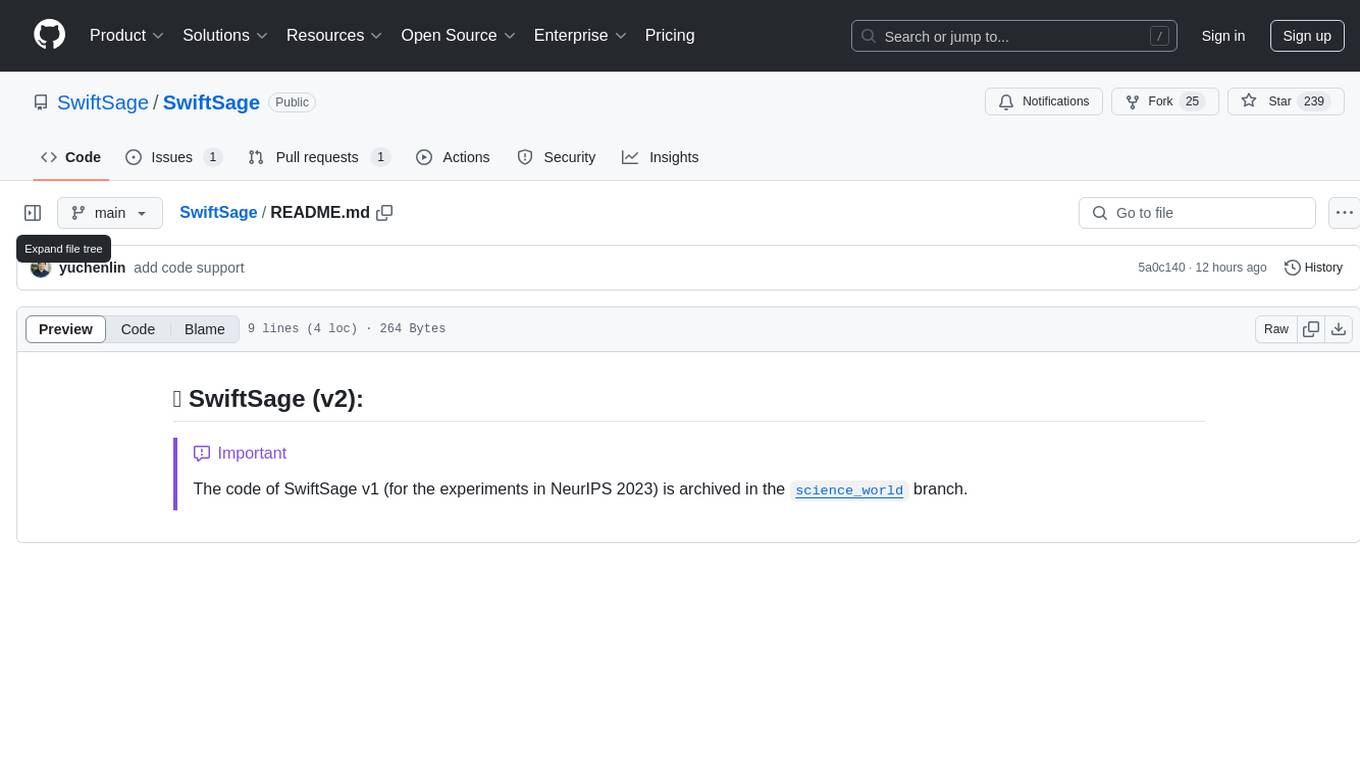
SwiftSage
SwiftSage is a tool designed for conducting experiments in the field of machine learning and artificial intelligence. It provides a platform for researchers and developers to implement and test various algorithms and models. The tool is particularly useful for exploring new ideas and conducting experiments in a controlled environment. SwiftSage aims to streamline the process of developing and testing machine learning models, making it easier for users to iterate on their ideas and achieve better results. With its user-friendly interface and powerful features, SwiftSage is a valuable tool for anyone working in the field of AI and ML.
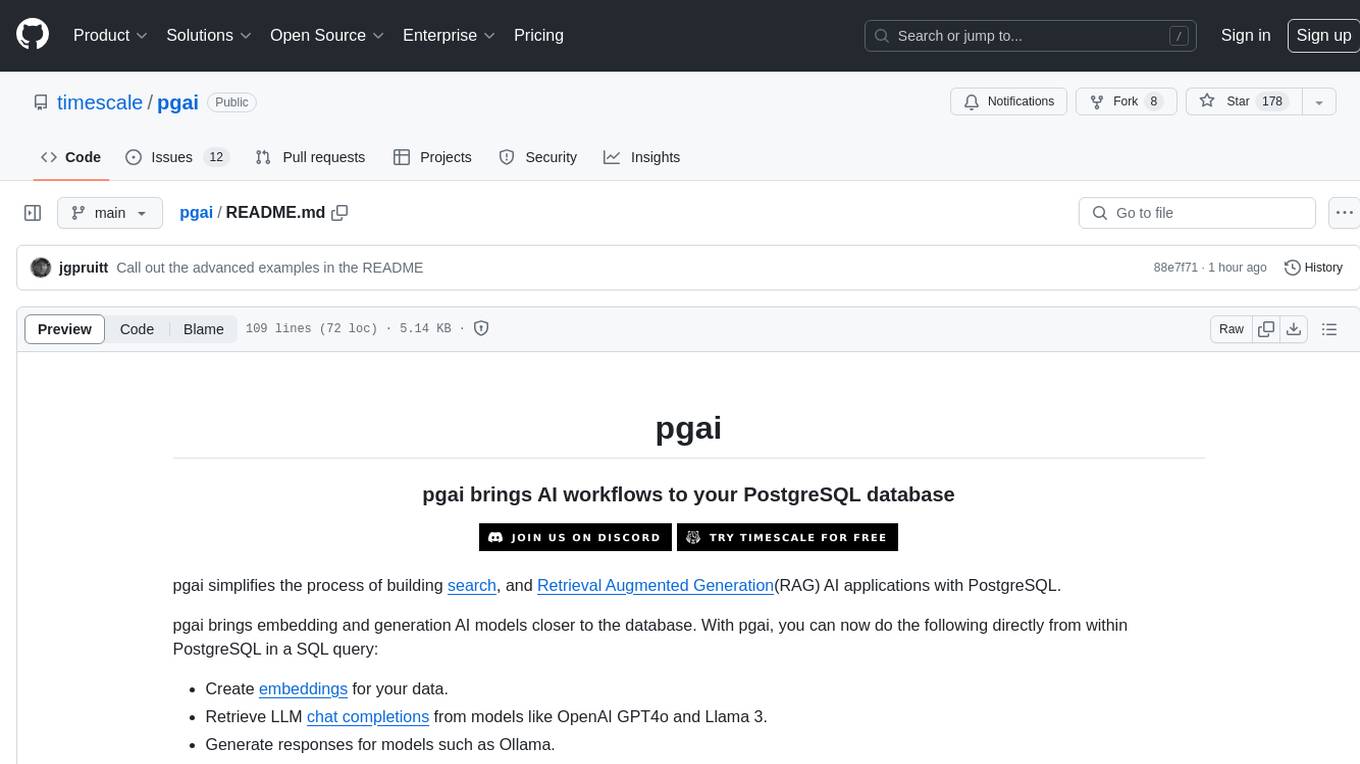
pgai
pgai simplifies the process of building search and Retrieval Augmented Generation (RAG) AI applications with PostgreSQL. It brings embedding and generation AI models closer to the database, allowing users to create embeddings, retrieve LLM chat completions, reason over data for classification, summarization, and data enrichment directly from within PostgreSQL in a SQL query. The tool requires an OpenAI API key and a PostgreSQL client to enable AI functionality in the database. Users can install pgai from source, run it in a pre-built Docker container, or enable it in a Timescale Cloud service. The tool provides functions to handle API keys using psql or Python, and offers various AI functionalities like tokenizing, detokenizing, embedding, chat completion, and content moderation.
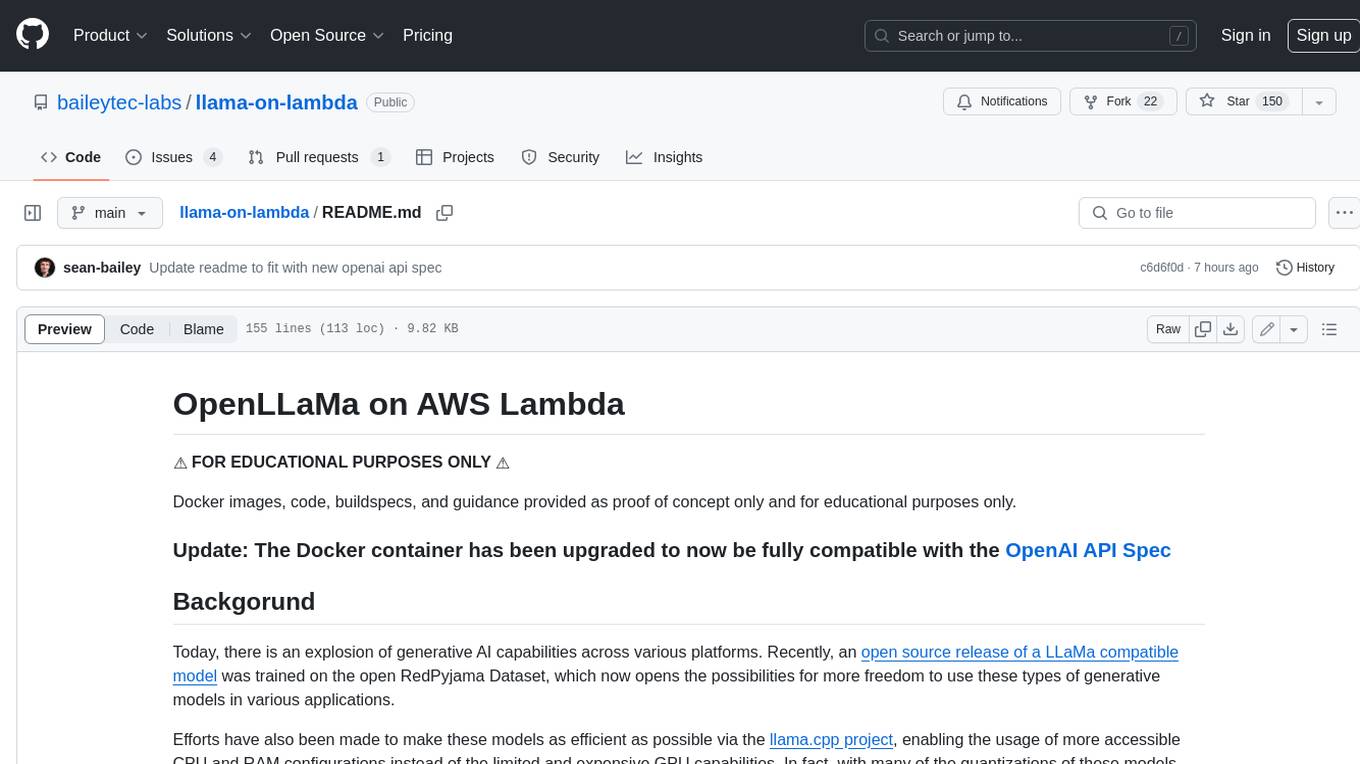
llama-on-lambda
This project provides a proof of concept for deploying a scalable, serverless LLM Generative AI inference engine on AWS Lambda. It leverages the llama.cpp project to enable the usage of more accessible CPU and RAM configurations instead of limited and expensive GPU capabilities. By deploying a container with the llama.cpp converted models onto AWS Lambda, this project offers the advantages of scale, minimizing cost, and maximizing compute availability. The project includes AWS CDK code to create and deploy a Lambda function leveraging your model of choice, with a FastAPI frontend accessible from a Lambda URL. It is important to note that you will need ggml quantized versions of your model and model sizes under 6GB, as your inference RAM requirements cannot exceed 9GB or your Lambda function will fail.
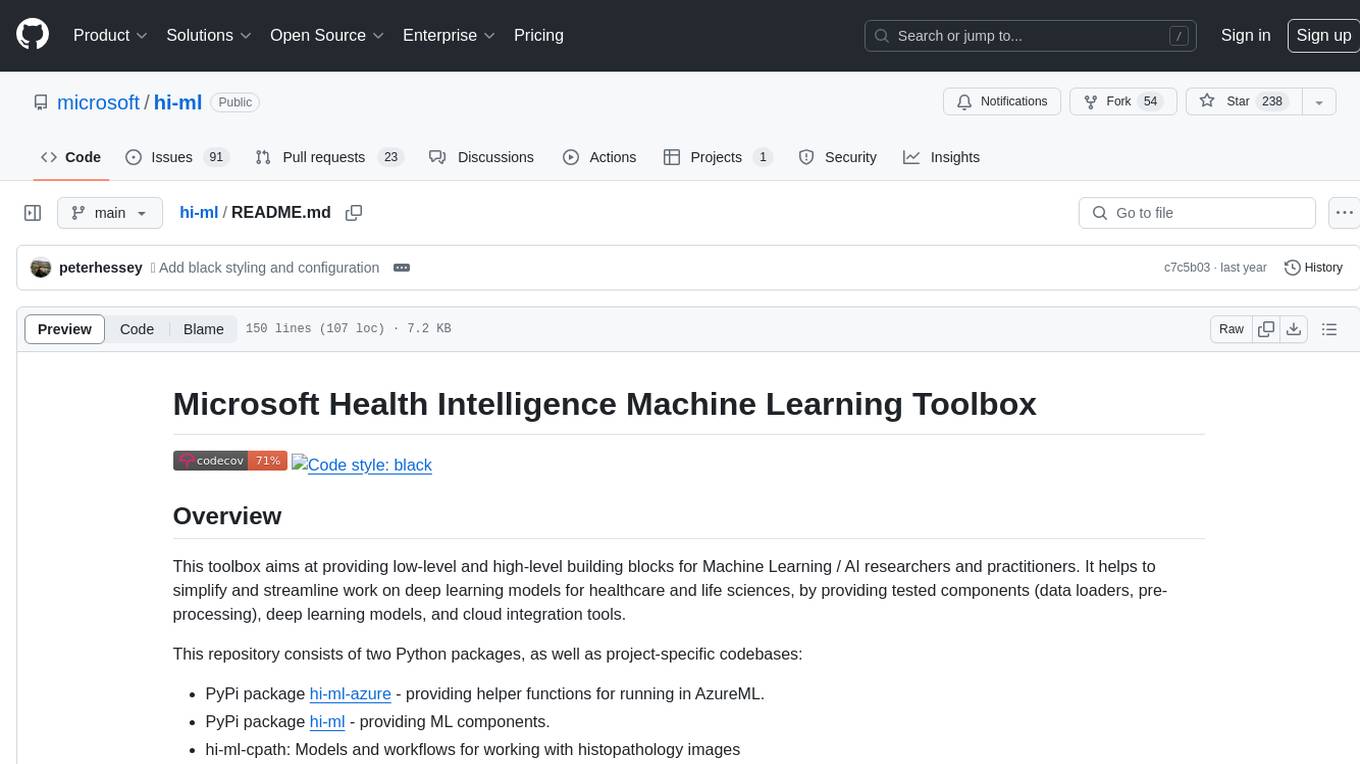
hi-ml
The Microsoft Health Intelligence Machine Learning Toolbox is a repository that provides low-level and high-level building blocks for Machine Learning / AI researchers and practitioners. It simplifies and streamlines work on deep learning models for healthcare and life sciences by offering tested components such as data loaders, pre-processing tools, deep learning models, and cloud integration utilities. The repository includes two Python packages, 'hi-ml-azure' for helper functions in AzureML, 'hi-ml' for ML components, and 'hi-ml-cpath' for models and workflows related to histopathology images.
For similar tasks

pydantic-ai
PydanticAI is a Python agent framework designed to make it less painful to build production grade applications with Generative AI. It is built by the Pydantic Team and supports various AI models like OpenAI, Anthropic, Gemini, Ollama, Groq, and Mistral. PydanticAI seamlessly integrates with Pydantic Logfire for real-time debugging, performance monitoring, and behavior tracking of LLM-powered applications. It is type-safe, Python-centric, and offers structured responses, dependency injection system, and streamed responses. PydanticAI is in early beta, offering a Python-centric design to apply standard Python best practices in AI-driven projects.
For similar jobs

promptflow
**Prompt flow** is a suite of development tools designed to streamline the end-to-end development cycle of LLM-based AI applications, from ideation, prototyping, testing, evaluation to production deployment and monitoring. It makes prompt engineering much easier and enables you to build LLM apps with production quality.

deepeval
DeepEval is a simple-to-use, open-source LLM evaluation framework specialized for unit testing LLM outputs. It incorporates various metrics such as G-Eval, hallucination, answer relevancy, RAGAS, etc., and runs locally on your machine for evaluation. It provides a wide range of ready-to-use evaluation metrics, allows for creating custom metrics, integrates with any CI/CD environment, and enables benchmarking LLMs on popular benchmarks. DeepEval is designed for evaluating RAG and fine-tuning applications, helping users optimize hyperparameters, prevent prompt drifting, and transition from OpenAI to hosting their own Llama2 with confidence.

MegaDetector
MegaDetector is an AI model that identifies animals, people, and vehicles in camera trap images (which also makes it useful for eliminating blank images). This model is trained on several million images from a variety of ecosystems. MegaDetector is just one of many tools that aims to make conservation biologists more efficient with AI. If you want to learn about other ways to use AI to accelerate camera trap workflows, check out our of the field, affectionately titled "Everything I know about machine learning and camera traps".

leapfrogai
LeapfrogAI is a self-hosted AI platform designed to be deployed in air-gapped resource-constrained environments. It brings sophisticated AI solutions to these environments by hosting all the necessary components of an AI stack, including vector databases, model backends, API, and UI. LeapfrogAI's API closely matches that of OpenAI, allowing tools built for OpenAI/ChatGPT to function seamlessly with a LeapfrogAI backend. It provides several backends for various use cases, including llama-cpp-python, whisper, text-embeddings, and vllm. LeapfrogAI leverages Chainguard's apko to harden base python images, ensuring the latest supported Python versions are used by the other components of the stack. The LeapfrogAI SDK provides a standard set of protobuffs and python utilities for implementing backends and gRPC. LeapfrogAI offers UI options for common use-cases like chat, summarization, and transcription. It can be deployed and run locally via UDS and Kubernetes, built out using Zarf packages. LeapfrogAI is supported by a community of users and contributors, including Defense Unicorns, Beast Code, Chainguard, Exovera, Hypergiant, Pulze, SOSi, United States Navy, United States Air Force, and United States Space Force.

llava-docker
This Docker image for LLaVA (Large Language and Vision Assistant) provides a convenient way to run LLaVA locally or on RunPod. LLaVA is a powerful AI tool that combines natural language processing and computer vision capabilities. With this Docker image, you can easily access LLaVA's functionalities for various tasks, including image captioning, visual question answering, text summarization, and more. The image comes pre-installed with LLaVA v1.2.0, Torch 2.1.2, xformers 0.0.23.post1, and other necessary dependencies. You can customize the model used by setting the MODEL environment variable. The image also includes a Jupyter Lab environment for interactive development and exploration. Overall, this Docker image offers a comprehensive and user-friendly platform for leveraging LLaVA's capabilities.

carrot
The 'carrot' repository on GitHub provides a list of free and user-friendly ChatGPT mirror sites for easy access. The repository includes sponsored sites offering various GPT models and services. Users can find and share sites, report errors, and access stable and recommended sites for ChatGPT usage. The repository also includes a detailed list of ChatGPT sites, their features, and accessibility options, making it a valuable resource for ChatGPT users seeking free and unlimited GPT services.

TrustLLM
TrustLLM is a comprehensive study of trustworthiness in LLMs, including principles for different dimensions of trustworthiness, established benchmark, evaluation, and analysis of trustworthiness for mainstream LLMs, and discussion of open challenges and future directions. Specifically, we first propose a set of principles for trustworthy LLMs that span eight different dimensions. Based on these principles, we further establish a benchmark across six dimensions including truthfulness, safety, fairness, robustness, privacy, and machine ethics. We then present a study evaluating 16 mainstream LLMs in TrustLLM, consisting of over 30 datasets. The document explains how to use the trustllm python package to help you assess the performance of your LLM in trustworthiness more quickly. For more details about TrustLLM, please refer to project website.

AI-YinMei
AI-YinMei is an AI virtual anchor Vtuber development tool (N card version). It supports fastgpt knowledge base chat dialogue, a complete set of solutions for LLM large language models: [fastgpt] + [one-api] + [Xinference], supports docking bilibili live broadcast barrage reply and entering live broadcast welcome speech, supports Microsoft edge-tts speech synthesis, supports Bert-VITS2 speech synthesis, supports GPT-SoVITS speech synthesis, supports expression control Vtuber Studio, supports painting stable-diffusion-webui output OBS live broadcast room, supports painting picture pornography public-NSFW-y-distinguish, supports search and image search service duckduckgo (requires magic Internet access), supports image search service Baidu image search (no magic Internet access), supports AI reply chat box [html plug-in], supports AI singing Auto-Convert-Music, supports playlist [html plug-in], supports dancing function, supports expression video playback, supports head touching action, supports gift smashing action, supports singing automatic start dancing function, chat and singing automatic cycle swing action, supports multi scene switching, background music switching, day and night automatic switching scene, supports open singing and painting, let AI automatically judge the content.




